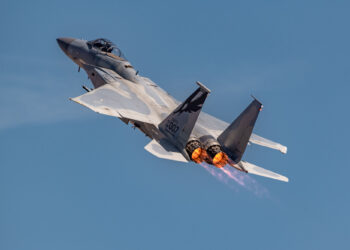Patuxent River, Md: The Naval Air Systems Command fuels team is gearing up for biofuels flight tests in an F/A-18 Super Hornet at Patuxent River, Md., by next spring or summer, according to NAVAIR’s fuel expert.
Rick Kamin, Navy fuels lead, explained that before “biofueling” the plane, the team will first conduct laboratory and rig tests at Pax River, followed by static engine tests with the Super Hornet’s F414 engine on a test stand at the Lynn, Mass., facility of manufacturer General Electric. The static tests will take place “probably in the December-January time frame,” Kamin said.
The NAVAIR fuels team is also getting ready to kick off a similar effort to test and certify biofuels for use on ships.
The upcoming tests are part of a larger effort to test and certify promising biofuels in support of the Navy’s energy strategy to enhance energy security and environmental stewardship, including reducing greenhouse gas emissions.
“Our major goal is a drop-in replacement” for the Navy’s petroleum-based fuels, Kamin said. “The field won’t know the difference.”
Fuels derived from plants are considered carbon neutral. Burning them doesn’t increase the net amount of carbon dioxide in the atmosphere because the carbon they contain was originally absorbed from the air as the plants grew.
NAVAIR has asked for 40,000 gallons of JP-5 jet fuel from bio-based feedstocks in a request for proposal (RFP) issued by the Defense Energy Support Center. Initial laboratory analyses and rig testing will consume 1,500 gallons; the static engine tests, 16,500 gallons; and the flight tests, 22,000 gallons. The feedstocks targeted are not used for food.
Kamin said fuels received from the JP-5 RFP may include those made from oils produced by plants such as camelina, jatropha and algae.
“We won’t know for sure what we’re going to get until the procurement process is completed,” he said. The contract signing is expected to take place this month.
Camelina, also known as gold-of-pleasure or false flax, is in the same family as rapeseed, the source of canola oil. Often considered a weed, camelina is cultivated today for the high quality oil its seeds produce, both for human consumption and conversion to biodiesel.
Jatropha is a tough woody plant that can grow in arid conditions unsuitable for most food crops. Its seeds produce oil that’s unfit for human consumption but can be converted to fuel.
Algae can be grown in vats or ponds under controlled conditions that maximize output and harvesting efficiency. Algae’s oil is produced within individual cells.
Oils harvested from the plants are refined into fuel with conventional petroleum refinery processes.
Two commercial biofuels that will not be tested are ethanol, now blended with gasoline, and biodiesel. Ethanol is unsafe for shipboard use because it ignites too easily, and its lower energy content would significantly reduce aircraft range.
The biodiesel sold commercially today consists of oxygen-containing compounds called esters. Although they burn well, esters absorb water too readily to be suitable for the Navy’s maritime environment.
For the upcoming static and flight tests, the biofuels will be mixed in a 50-50 blend with conventional petroleum-derived jet fuel to provide the necessary specification properties. Biofuels are not as dense as conventional jet fuel, have less lubricating ability and contain no aromatic compounds, a group of chemical compounds able to penetrate the rubberlike materials that make up gaskets and seals.
“Aromatics are critical for seal swelling,” Kamin noted. “The easiest way to get these properties back in is with a blend with petroleum-based fuels.”
Kamin emphasized that the Navy will not be producing any biofuels itself. Fuel for all military services is purchased by the Defense Energy Support Center.
“We’re responsible for fuel specification requirements. Our main responsibility is to test and certify the alternative fuels for inclusion in our specifications,” he said.
The fuels team will initially apply three categories of standard tests to the fuels received in response to the RFP: analytical chemistry – using instruments such as a mass spectrometer to determine chemical composition and structure, “wet chemistry” – determining the fuels’ response in specific chemical reactions and rig test properties such as water separability, to determine how the fuels will react in aircraft and in conditions typical of Navy operating conditions, which include long-term storage.
“Storage stability is a unique military and Navy requirement not required in the commercial world,” Kamin noted.
“We’re trying to certify by families, to come up with a spec for an approved class of feedstocks, such as oil shale, petroleum, hydrotreated renewable or coal,” he said. The specifications of each family will be determined initially through the full battery of chemical analysis, physical properties, static engine tests and flight tests.
The Navy plans to have test and certification completed on the most promising alternative fuel candidates no later than 2013, Kamin said. As each candidate is approved for use, it will be added to the Navy’s JP-5 (aircraft) and F-76 (ship propulsion fuel) specifications. Once in the specification, the Defense Energy Support Center can buy the fuel to meet Navy requirements from the lowest-cost provider. Actual usage in the fleet will depend on industry production capability.









